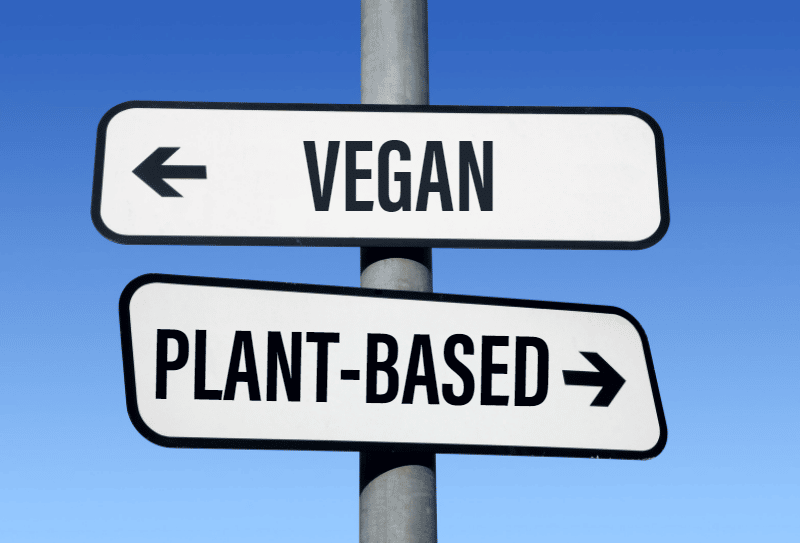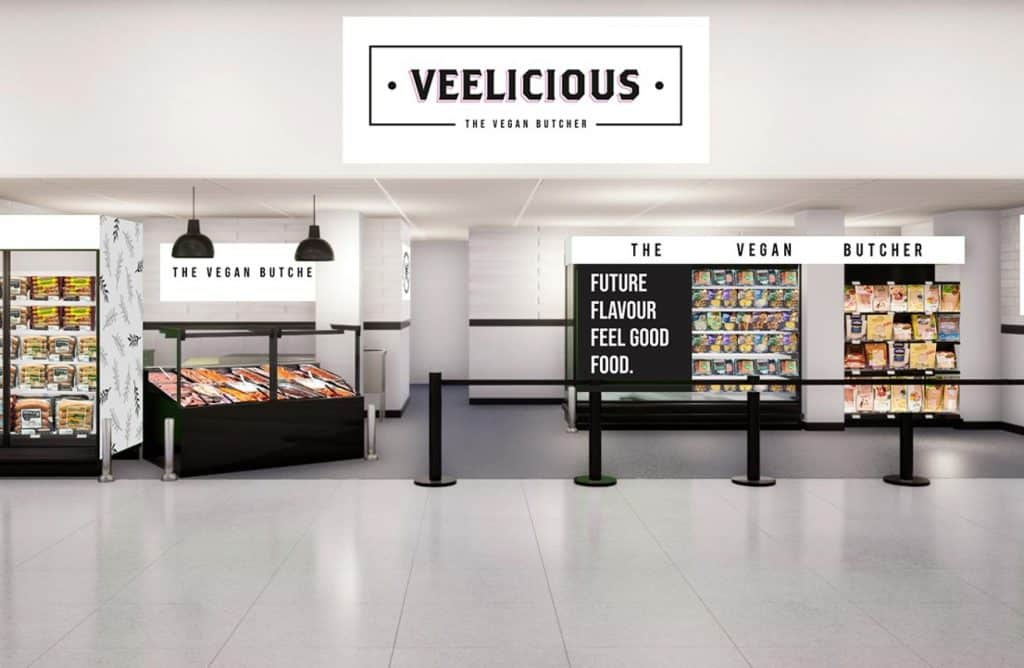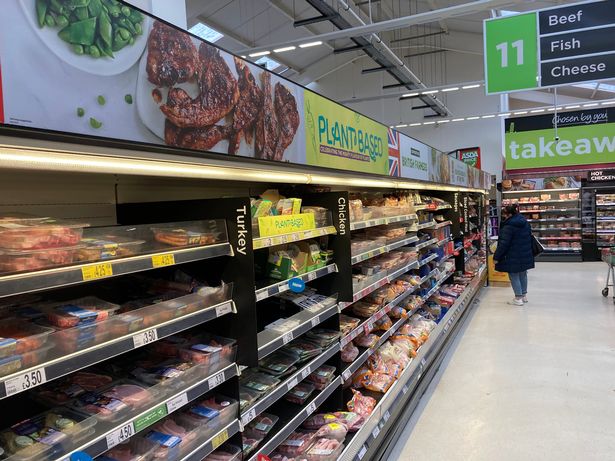Executive Summary
To appeal to mainstream flexitarian consumers:
- Don’t use the terms ‘meat-free’, ‘vegan’, or ‘vegetarian’ — these are considered ‘healthy-restrictive’ phrases that are off-putting to most consumers.
- Do emphasize provenance, flavor, look and feel – these appeal to consumers’ primary motivators, and will entice them to try your product.1
- Consumer understanding of the term ‘plant-based’ varies widely between demographics and countries, so tailored terminology is best. If you’re unsure, or need your packaging to work in multiple regions, put ‘100% plant-based’ on the front, and a V-Label on the back.
Introduction
When marketing meat-free products, brands and retailers have a choice of terminology: ‘vegan’, ‘plant-based’, or both. But which terms appeal to flexitarian consumers the most? And how well is each term understood? In this short article, you’ll learn which terminology resonates with which demographics and countries, and how to maximize the appeal of your plant-based alternatives.
Pros of labeling a product as ‘vegan’
Vegan food products contain no animal-based ingredients. Organizations like V-Label exist to certify this status and give consumers confidence. The term ‘vegan’ is well-understood by flexitarians in English-speaking countries, with 72% of Brits and 64% of Americans understanding that a vegan product ‘definitely does not contain animal meat, eggs, or dairy.’ By comparison, only 51% of flexitarian Brits and 54% of flexitarian Americans believe that the same statement applies to products labeled as ‘plant-based’.2
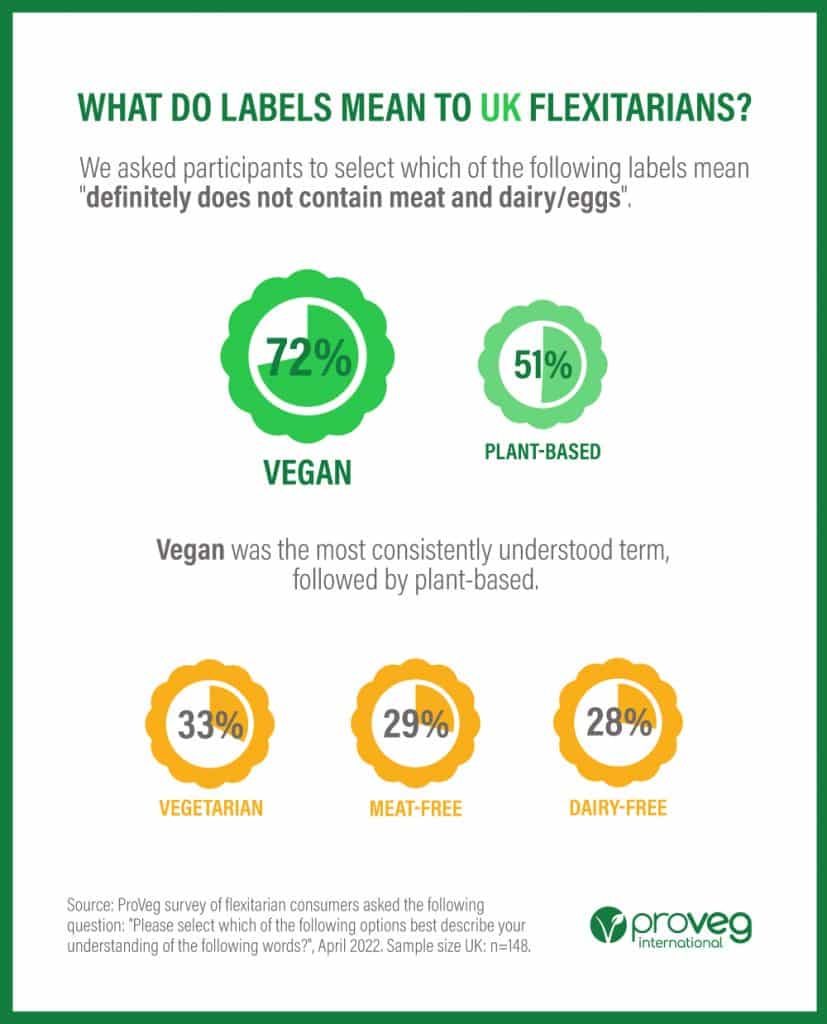
The term ‘vegan’ is becoming better understood internationally. This can, in part, be attributed to the increasingly global annual Veganuary campaign, which had 620,000 sign-ups in 2022.
Cons of labeling a product as ‘vegan’
Firstly, there is no formal legal definition in the UK or EU regarding a vegan or plant-based product.3 This is perhaps an underlying cause of consumer confusion, as the two terms are used interchangeably across the Global North with varying meanings. That’s why it’s so important that products get V-Label or equivalent certification, as it’s the most reliable way to give consumers seeking 100% animal-free products the confidence that might otherwise be lacking based on terminology alone.
Secondly, the term ‘vegan’ may lead some flexitarians or mixed-eaters to think that a product isn’t intended for them.4 So what’s the solution if you still want to use the V-word? Make it discrete, or put it on the back of the product. Flexitarians won’t be put off, and vegans will always be motivated to check the back-of-pack, so you’ll still be reaching both segments. Again, using the V-Label helps to bypass this problem as it’s a discrete indicator that dedicated vegan consumers know to look out for.
Is your product V-Label-certified?
Established in Switzerland in 1996, V-Label is an internationally recognized, registered seal for labeling vegan and vegetarian products and services. Globally, V-Label has 50,000 certified products and 43,00 partner companies. V-Label certification can help your product to resonate with modern consumers seeking plant-based alternatives.
Pros of labeling a product as ‘plant-based’
The first pro here dovetails with the previous section. Labeling your product as ‘plant-based’ avoids the need for your brand or the consumer to be fully aligned with broader philosophical or ethical vegan values.
Secondly, broadening your appeal in this way won’t lose you the custom of shoppers specifically seeking vegan products. Half of the consumers buying plant-based alternatives always check the ingredients label in order to be confident that the product is animal-free.5 (Of course, certifying your product with a V-Label on the back-of-pack is definitely the easiest way to reduce consumer friction when they’re considering whether or not to buy it).
Research by the Good Food Institute also found that variants of the label ‘plant-based’ increased mainstream consumer purchasing intent by around 20% compared to the label ‘vegan’.6
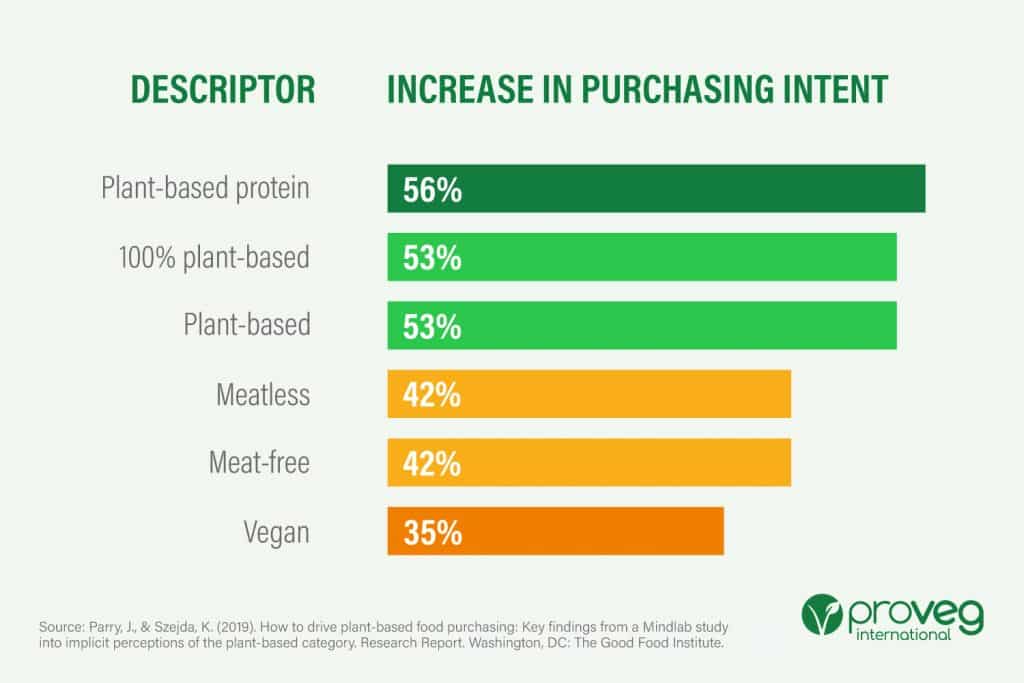
‘Plant-based protein’ is the most appealing of these six vegan food descriptors.
Cons of labeling a product as ‘plant-based’
We’ve seen that the term ‘plant-based’ may hold the broadest appeal, but it also brings confusion. Multiple studies have found that consumers aren’t clear on what the term means – partly because, as discussed, there’s no legal definition in most Western markets.78
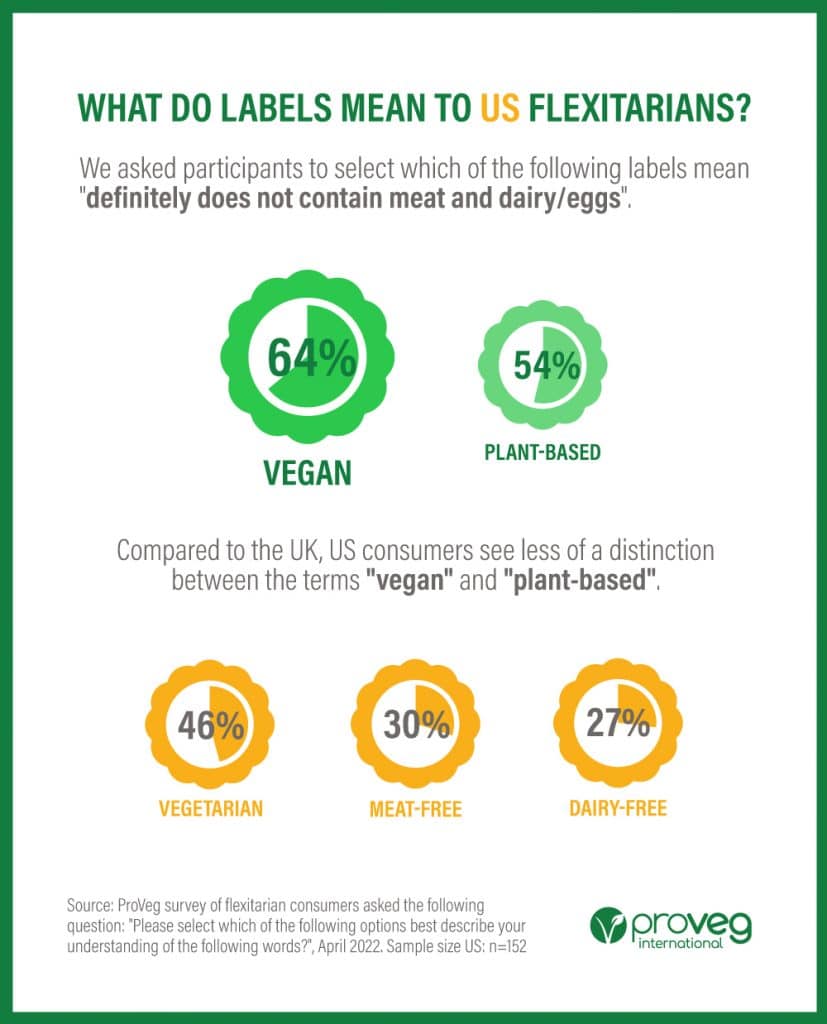
This perhaps highlights some differing regional attitudes to meat-free versus low-meat diets and similar dietary aspirations. In France, 24% of consumers identify as flexitarian,9 whereas in neighboring Germany the figure is as high as 55%,10 although we know from survey data that being a flexitarian means different things to different consumers.
Even so, the majority of flexitarians seek plant-based alternatives to animal-based ingredients for health reasons.11 In order to best attract these consumers, we recommend using the label ‘100% plant-based’. This makes the status of the product explicitly clear to health-conscious flexitarians without alienating indulgence-seeking consumers who could find a front-of-pack ‘vegan’ label off-putting.
Country variability
A US perspective
We are firm believers that the term ‘plant-based’ is where the industry will go. The word ‘vegan’ is so loaded with activist imagery from the ’60s and ’70s that it sounds scary and divisive. The reasons flexitarian consumers are leaning toward plant-based foods are as much about health.”
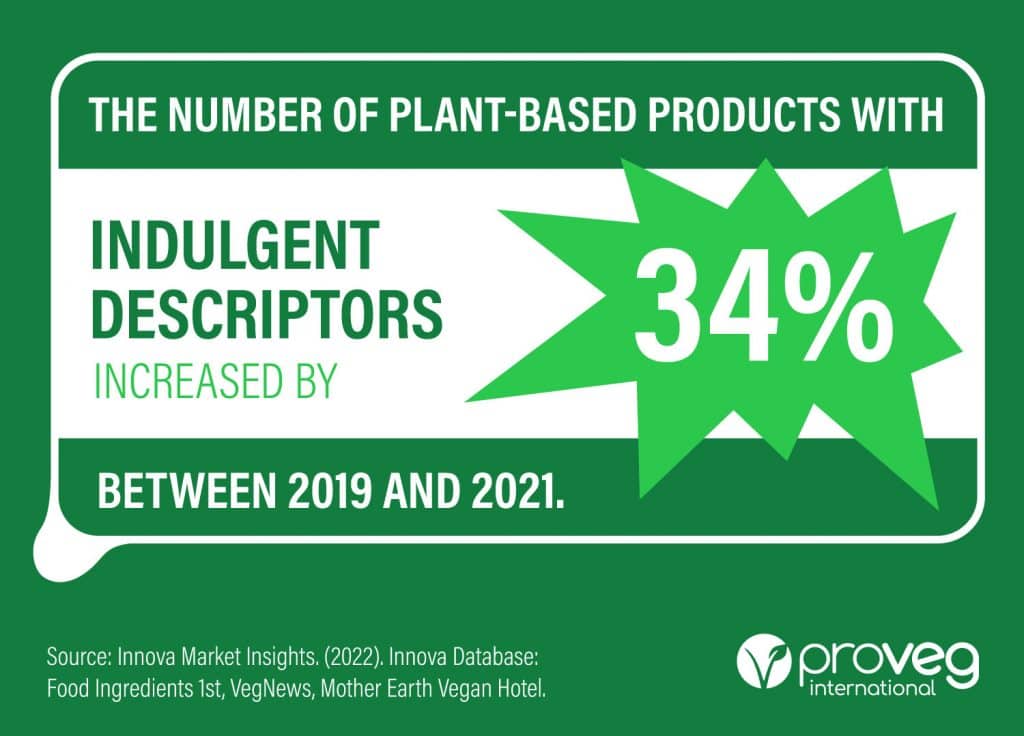
But as we explain in our guide to taste-based marketing, taste still ranks above health in consumer motivations – meaning that plant-based alternatives need to appeal to the flexitarians who are seeking indulgence above all else. For that reason, whether you’re labeling your product as ‘plant-based’ or ‘vegan’, you need to lead with the promise of indulgence. Why? Because research conducted at Stanford University found that, in the US, ‘unhealthy’ is associated with ‘tasty’.1314
A French perspective
A subsequent study found that in France (in contrast to perceptions in the US), ‘healthy’ is associated with ‘tasty’, and ‘unhealthy’ with ‘untasty’ – so French plant-based brands should emphasize their delicious veggie credentials to entice flexitarians!15 But what are ‘veggie’ credentials in the minds of French consumers?
The French market currently conflates ‘vegetarian’ and ‘vegan’ more than other markets. For instance, Carrefour’s sustainability plan outlines their transition away from animal-based meats. But the definition of ‘meat-free’ diverges here from other nations:
“Veggie, or vegetarianism (from the English word ‘vegan’), is a diet without meat, fish or shellfish. Some vegetarians even refuse to eat eggs, milk and dairy products.” — Carrefour16
The retailer made headlines in early 2022 when it launched its first trial of a vegan deli counter.17 The products were supplied by popular Dutch brand The Vegetarian Butcher, which has a product range that is currently around 50% vegan. Similarly, Nestlé’s Garden Gourmet range advertises itself as plant-based – but many products contain egg and/or dairy, making them vegetarian rather than vegan.
If target consumers can’t tell at a glance whether or not a product is vegan or vegetarian, then the brand should certify it with a V-Label to provide clarity quickly.”
If you’re an international brand, it’s essential to know whether these distinctions matter to your target flexitarian consumers. The use of the V-Label can help to remove any ambiguity by certifying a plant-based alternative as being either ‘vegetarian’ or ‘vegan’.
A German perspective
Germany has the highest rates of flexitarianism in Europe – up to 55%.18 So which term draws them to plant-based products the most?
From our experience of working with producers, retailers, and consumers across the country, it would appear that ‘vegan’ is less of a divisive term in Germany than in other countries. Perhaps this would explain why Lidl wasn’t afraid to put V-Labels on shelf indicators beside its vegan products? (See our case study below)
A similar indication would be McDonald’s plant-based burger. In the UK, the restaurant chain branded the product as the ‘McPlant’, in keeping with other companies’ decisions to avoid the V-word in Britain.
In Germany, by contract, McDonald’s used the V-word loud and proud, launching the burger as ‘Der Big Vegan TS’.
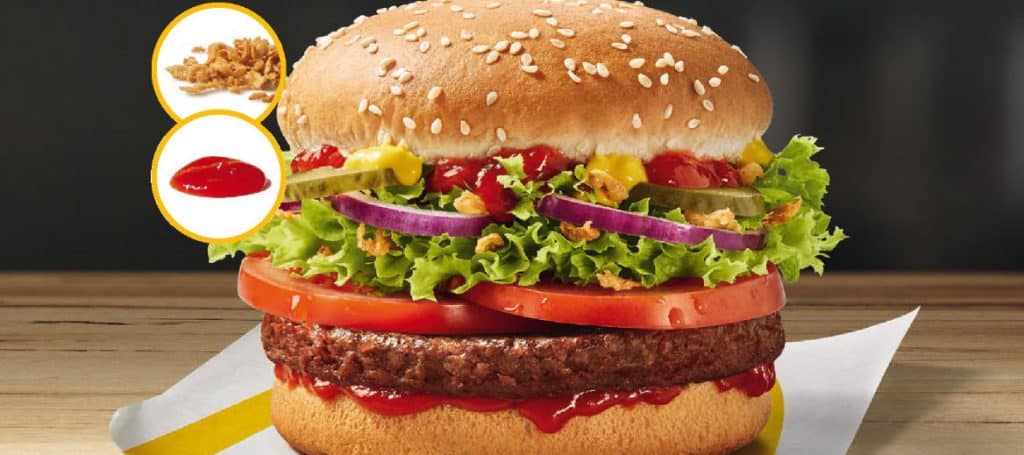
In the UK and US, it’s called the ‘McPlant’. In Germany it’s called the ‘Big Vegan’. It’s all about knowing your target consumer.
In the UK, most retailers avoid any association with the V-word. In Germany, the opposite is true.
For instance, Sainbury’s own-label vegan range is called ‘Plant Pioneers’, Tesco’s is ‘Plant Chef’, Asda’s is ‘Plant Based’, and Marks & Spencer’s is ‘Plant Kitchen’.
By contrast, in Germany, Lidl’s own label range is called ‘Vemondo’, Aldi Nord’s is ‘Mein Veggie Tag’, Edeka’s is ‘Vehappy’, Netto’s is ‘Vegetar!a’, and Kaufland’s is ‘K-take it veggie’.
You get the idea.
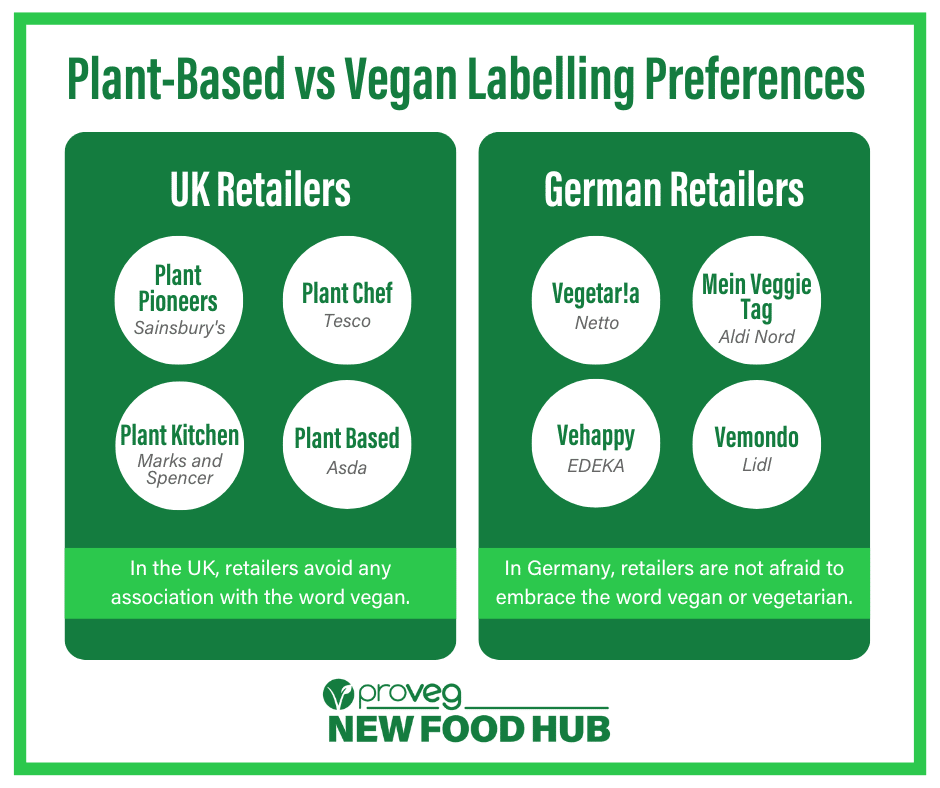
Case Study: Lidl Germany adds V-Labels to its shelves
ProVeg has been supporting Lidl Germany with developing its plant-based range since 2019. We’ve helped the company taste-test over 100 products, and engaged 70,000 members of the general public in choosing which products to prioritize, as the retailer continues to expand its vegan range.
In 2021, Lidl Germany launched 44 new plant-based alternatives in more than 3,200 stores nationwide. More than 450 products sold in Lidl Germany are now certified with the V-Label.
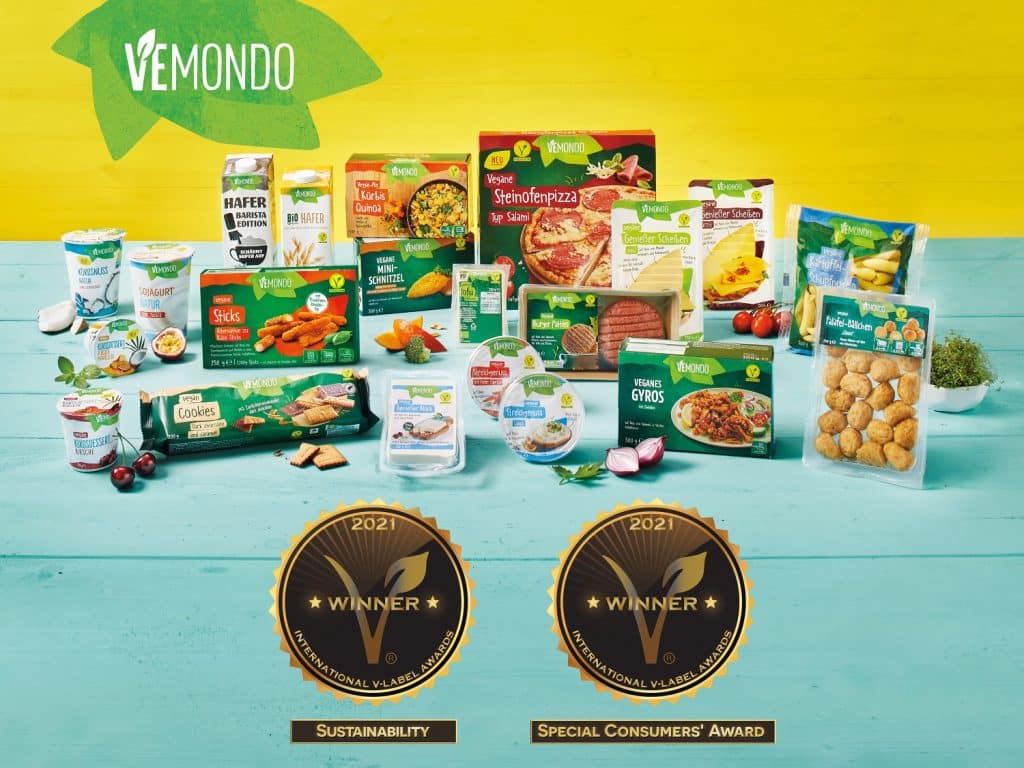
Lidl’s plant-based Vemondo range was a V-Label award winner in 2021.
Knowing that mainstream German consumers don’t find the V-word off-putting, Lidl went one step further (with support from ProVeg). It became the first retailer to use the V-Label on price indicators on its shelves.
This move has enabled Lidl to highlight plant-based alternatives to mainstream consumers who are looking to reduce their animal-based meat intake, without the vegan associations being detrimental.
Furthermore, Lidl has upped its placement game. The retailer’s plant-based products are now fully integrated into the traditional aisles. By placing them next to their animal-based counterparts, Lidl is making plant-based alternatives visible and easily accessible to flexitarian consumers.

ProVeg Tips
Is your business looking for expert support in growing your plant-based range, or reaching mainstream consumers? We’re here to help. Drop us a line at [email protected].
Other European perspectives
“We never considered the idea that it might be counter-productive to label something as ‘vegan’,” said one Corporate Social Responsibility specialist at a major European discounter, in an interview with ProVeg.
However, research by the EU Smart Protein project led by ProVeg found that terminology has a significant and variable impact on consumers in different countries. For instance, consumers in Belgium and the Netherlands find ‘plant-based’ to be more appealing than ‘vegetarian’ or ‘vegan’, whereas Danish and Spanish consumers are indifferent.19

ProVeg Tips
Many products are ‘accidentally vegan’ – getting V-Label certification is an easy way to increase a product’s appeal to health-conscious flexitarians without alienating mainstream consumers.
A UK perspective
In the UK, major retailers such as Asda, Tesco, and Coop favor ‘plant-based’ over ‘vegan’ to describe their 100% vegan ranges.
“Plant-based has become the most-requested product type from our customers and the most talked-about in our business. We’re looking to merge plant-based foods with wherever the equivalent products sit,” explains John Gill, Head of Marketing and Trading at Northern English food retailer Booths.
But retailers are also hedging their bets in order to make sure that they catch all potential plant-based consumers. For instance, when Asda experienced a 275% increase in searches for ‘vegan’ products on their e-commerce website between 2019 and 2020,20 the company responded by launching the UK’s first nationwide shelf-stable ‘plant-based’ aisles. Its subsequent introduction of integrated-segregated vegan ranges in protein aisles also uses the ‘plant-based’ label.
Asda’s nationwide stores use the ‘plant-based’ banner, while its trial London deli uses the ‘vegan’ label.
These first two initiatives present shelf sections to consumers under the ‘plant-based’ banner in order to maximize appeal to UK flexitarians who don’t necessarily identify with a vegan diet or lifestyle. However, Asda is embracing the word ‘vegan’ more explicitly for their trial plant-based deli counter in London, a cosmopolitan city with a higher proportion of young (and thus more plant-leaning) consumers than other British cities. Asda’s vegan deli counter is called ‘Veelicious: the vegan butcher’.21 This approach makes sense when you consider that many flexitarians seek plant-based alternatives for the novelty value22 – which is exactly what a vegan deli counter provides. A dual-terminology strategy tailored to different market segments may ensure the broadest possible reach.
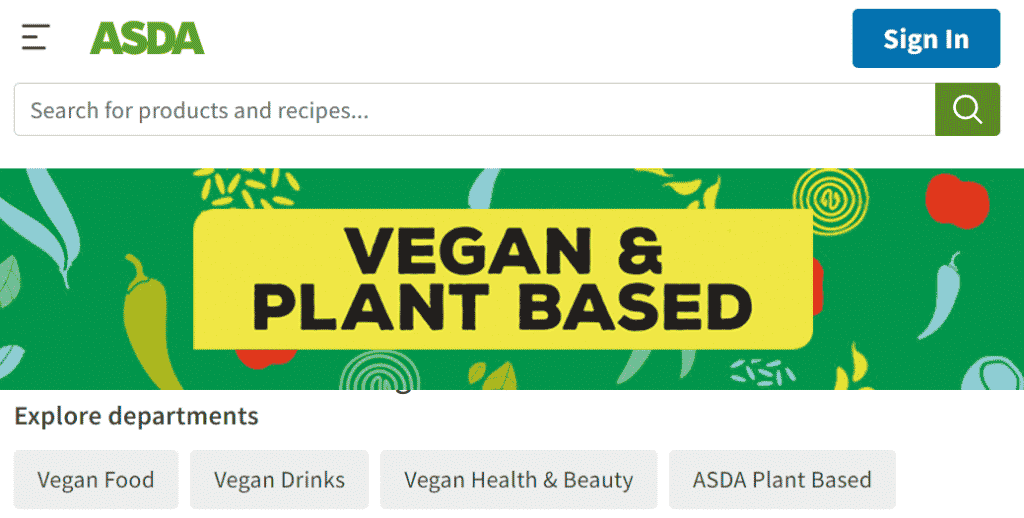
Best of both worlds?
On its e-commerce website, Asda combines both terms in the overall category name. But in the dietary-preferences filter, ‘plant-based’ is not an option, whereas ‘vegan’ is. This again relates to the fact that flexitarians aren’t necessarily proactively looking for plant-based dietary options, but when they do, they’ll search for ‘vegan’. Otherwise, they may spot plant-based alternatives in-store or through online swap recommendations, and be introduced that way. Using a combination of terms in different settings helps Asda to maximize the appeal of its animal-free alternatives to the widest possible audience.
Conclusion
The right terminology depends on your target market, but, as a rule of thumb, ‘100% plant-based protein’ on the front-of-pack, with V-Label (vegan) certification on the back, is the best dual-strategy to maximize your product’s appeal to flexitarian consumers across countries.
Are you looking to take your plant-based marketing to the next level? We work with companies along the entire value chain, which gives us unique insights into the key challenges, hurdles, and opportunities at every stage of the journey as you take your product to market. Reach out to us at [email protected] to get started.
Note: ProVeg conducts exclusive interviews with a wide range of industry professionals for its New Food Hub white papers. Unless an alternative citation is provided, quotations are from those interviews. Some interviewees wished to remain anonymous.
References
- Vennard, D., & Wise, J. (2019): It’s All in a Name: How to Boost the Sales of Plant-Based Menu Items. World Resources Institute. Available at https://www.wri.org/insights/its-all-name-how-boost-sales-plant-based-menu-items Accessed 2022-04-21
- ProVeg (forthcoming, 2022): ProVeg survey of consumers who identify as flexitarian. Sample sizes: UK n = 148. USA n = 152.
- Martin, P. (2021): Plant-based food labeling: what the law says. Food Manufacture. Available at https://www.foodmanufacture.co.uk/Article/2021/11/29/Vegan-food-labelling-what-the-law-says Accessed 2022-04-21
- Michail, N. (2018): Interview with GFI co-founder Bruce Friedrich. Food Navigator. Available at https://www.foodnavigator.com/Article/2018/01/15/Avoid-the-V-word-and-other-tips-to-boost-meat-free-and-dairy-free-sales Accessed 2022-04-21
- Innova Market Insights (2021): Innova Top Ten Trends Survey 2021, Lifestyle & Attitude 2021, Meat, Dairy & Alternative Protein 2021, average of Brazil, China, France, Germany, India, Indonesia, Mexico, Spain, the United Kingdom and the United States.
- Parry, J., & Szejda, K. (2019): How to drive plant-based food purchasing: Key findings from a Mindlab study into implicit perceptions of the plant-based category. Research Report. Washington, DC: The Good Food Institute. Available at https://go.gfi.org/Mindlab-Strategic-Recommendations Accessed 2022-04-19
- The Vegan Society (2020): The Vegan Society’s stance on the ‘vegan’ vs. ‘plant-based’ debate. Available at https://www.vegansociety.com/news/news/vegan-society%E2%80%99s-stance-%E2%80%98vegan%E2%80%99-vs-%E2%80%98plant-based%E2%80%99-debate Accessed 2022-04-21
- Innova Market Insights (2021): Innova Top Ten Trends Survey 2021, Lifestyle & Attitude 2021, Meat, Dairy & Alternative Protein 2021, average of Brazil, China, France, Germany, India, Indonesia, Mexico, Spain, the United Kingdom and the United States.
- IFOP (2021): Vegetarians and flexitarians in France in 2021. Available at https://www.ifop.com/wp-content/uploads/2021/05/Synthese-_-Vegetariens-et-Flexitariens-en-France-en-2020-IFOP.pdf Accessed 2022-04-26
- Vegconomist (2020): Study Shows Meat Consumption in Germany is Declining. Available at https://vegconomist.com/market-and-trends/study-shows-meat-consumption-in-germany-is-declining/ Accessed 2022-04-26
- Smart Protein Project (2021): ‘What consumers want: A survey on European consumer attitudes towards plant-based foods. Country specific insights’ European Union’s Horizon 2020 research and innovation program (No 862957). Available at https://smartproteinproject.eu/wp-content/uploads/FINAL_Pan-EU-consumer-survey_Overall-Report-.pdf Accessed 2022-04-21
- Stuckey quoted in Mattson (2017): Five Food & Beverage Macro Trends For 2017. Available at https://www.mattsonco.com/wp-content/uploads/2017/04/Mattson_MacroTrends_2017.pdf Accessed 2022-04-21
- Martinovitch, M. (2017): Decadent-sounding descriptions could lead to higher consumption of vegetables, Stanford research finds. Available at https://news.stanford.edu/2017/06/12/decadent-sounding-labeling-may-lead-people-eat-vegetables/ Accessed 2022-04-21
- Crum, A. J., Corbin, W. R., Brownell, K. D., & Salovey, P. (2011): Mind over milkshakes: Mindsets, not just nutrients, determine ghrelin response. Health Psychology. Available at https://psycnet.apa.org/record/2011-09907-001 Accessed 2022-04-21
- Werle, C., Trendel O., & Ardito G. (2012): Unhealthy food is not tastier for everybody: The “healthy = tasty” French intuition. Food Quality and Preference. Available at https://www.sciencedirect.com/science/article/abs/pii/S0950329312001334 Accessed 2022-04-21
- Carrefour (2019): Double the number of products in the vegetarian range in 2019: Eating more vegetarian products, also means eating more responsibly. Available at https://www.carrefour.com/en/group/food-transition/vegetarian-friendly-food Accessed 2022-04-21
- Morgan, E. (2022): Carrefour France trials a ‘vegan butcher’ product range. Available at https://www.connexionfrance.com/article/Mag/Food-and-Drink/Carrefour-France-trials-a-vegan-butcher-product-range Accessed 2022-04-21
- Vegconomist (2020): Study Shows Meat Consumption in Germany is Declining. Available at https://vegconomist.com/market-and-trends/study-shows-meat-consumption-in-germany-is-declining/ Accessed 2022-04-26
- Faber I., Castellanos-Feijoó, N., Van de Sompel L., Davydova, A., & Perez-Cueto F. (2019): Attitudes and knowledge towards plant-based diets of young adults across four European countries. Exploratory survey. Appetite. Available at https://www.sciencedirect.com/science/article/abs/pii/S0195666319300911?via%3Dihub Accessed 2022-04-26
- ASDA (2020): Asda Becomes the First UK Retailer to Launch Ambient Vegan Aisle. Available at https://corporate.asda.com/newsroom/2020/09/21/asda-becomes-the-first-uk-retailer-to-launch-ambient-vegan-aisle Accessed 2022-01-20
- ASDA (2021): Asda trials vegan butcher concept as plant-based eating grows in popularity. Available at https://corporate.asda.com/newsroom/2021/01/05/asda-trials-vegan-butcher-concept-as-plant-based-eating-grows-in-popularity Accessed 2022-04-21
- Morrison, O. (2021): ‘The novelty is waning’: Can moving ‘beyond mimicking’ help avoid plant-based fatigue? Available at https://www.foodnavigator.com/Article/2021/12/03/The-novelty-is-waning-Can-moving-beyond-mimicking-help-avoid-plant-based-fatigue Accessed 2022-04-26
